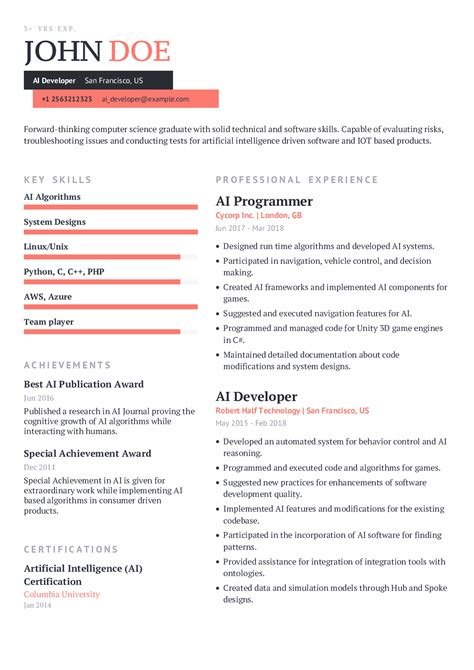Learn how AI is transforming the job application process, from resume screening to evaluation, and how to adapt your resume writing for AI.In today’s digital age, technology is revolutionizing every aspect of our lives, including the way we search for jobs and submit our applications. One of the latest advancements in this area is the use of Artificial Intelligence (AI) in resume screening and evaluation. In this blog post, we will delve into the world of AI resume screening and its impact on job applicants.
First, we will explore the concept of AI resume screening and how it is transforming the traditional hiring process. We will then discuss the implications of implementing AI in resume writing, and how job seekers can optimize their resumes to effectively pass through AI filters. Additionally, we will examine the effects of AI on resume evaluation from the perspective of employers and HR professionals. Finally, we will provide valuable insights on how job applicants can adapt to AI in their job search and application process.
Join us as we uncover the evolving landscape of AI in job applications and provide essential tips for navigating this new era of resume screening.
Understanding AI Resume Screening
Understanding AI Resume Screening
Artificial intelligence (AI) is drastically changing the way companies screen job applicants. AI uses various algorithms to analyze resumes and identify the most suitable candidates for a particular position. This innovative technology has the potential to streamline the hiring process and save employers valuable time and resources.
By leveraging AI in resume screening, companies can efficiently sort through large volumes of applications, identify top talent, and eliminate unconscious bias in the hiring process. With advanced AI tools, recruiters can focus their attention on candidates with the highest potential, ultimately leading to better hiring decisions and improved employee retention.
However, it’s essential for job seekers to understand the implications of AI resume screening and tailor their resumes to optimize visibility to these systems. This may involve using specific keywords, formatting styles, and other strategies to ensure that their resumes stand out to AI algorithms. As AI continues to shape the recruitment industry, it’s crucial for both employers and job seekers to adapt to this new method of resume screening. Understanding how AI works in this context can help create more efficient and fair hiring processes for everyone involved.
Implementing AI in Resume Writing
Implementing AI in Resume Writing
In today’s digital age, the use of AI technology has extended to various industries, including the realm of resume writing. With the increasing competition in the job market, job seekers are constantly looking for ways to make their resumes stand out from the rest. This is where the implementation of AI in resume writing comes into play.
AI can help job seekers tailor their resumes to specific job postings by analyzing keywords and phrases that are most relevant to the position. This not only saves time for the job seeker, but also ensures that their resume is optimized for the specific role they are applying for. Additionally, AI can provide valuable insights and suggestions for improving the content and formatting of the resume, helping job seekers present themselves in the best possible light.
Furthermore, the use of AI in resume writing can also help employers and recruiters streamline their resume screening process. AI-powered tools can quickly and efficiently scan through a large volume of resumes, identifying top candidates based on predetermined criteria. This not only saves time and resources for the hiring team, but also ensures that no qualified candidate goes unnoticed.
Effects of AI on Resume Evaluation
With the advent of artificial intelligence (AI) technology, the landscape of job application processes has significantly changed. One of the most notable effects of AI is its impact on resume evaluation. Traditionally, resumes were reviewed by human recruiters who would assess the qualifications and experiences of the candidates. However, with the introduction of AI-powered resume screening tools, the evaluation process has become more efficient and systematic.
AI algorithms are designed to analyze resumes based on predetermined criteria set by the employers. These criteria may include relevant keywords, work experience, education, and skills. The use of AI in resume evaluation has led to the automation of the initial screening process, allowing companies to quickly filter through a large pool of applicants and identify the most suitable candidates for further consideration.
While AI has undoubtedly improved the speed and accuracy of resume evaluation, it has also raised concerns about potential biases in the screening process. AI algorithms may inadvertently prioritize certain qualifications or attributes, leading to the exclusion of qualified candidates who do not fit the predetermined criteria. Additionally, there is a risk of algorithmic bias based on factors such as gender, race, or socio-economic background, which can result in discriminatory outcomes.
Adapting to AI in Job Applications
With the rise of artificial intelligence (AI) in various aspects of our lives, it’s no surprise that it has also been integrated into job applications. As companies seek to streamline their hiring processes, they are turning to AI to help them sift through the high volume of resumes they receive.
This means that job seekers need to understand how AI is being used in the resume screening process and adapt their application strategies accordingly. It’s no longer enough to simply have a well-written resume; now, candidates must also consider how their resumes will be interpreted by AI algorithms.
Adapting to AI in job applications also means understanding the keywords and formatting that AI systems are looking for. This may involve tailoring your resume to include relevant keywords and optimizing the formatting to ensure that it is easily digestible by AI programs.
